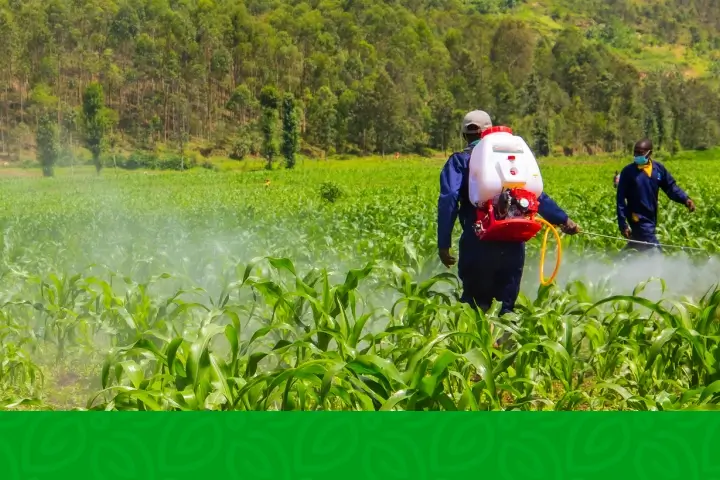
In a resolute stride towards a greener and more sustainable agricultural landscape, Rwanda is spearheading a formidable campaign against the rampant usage of illegal pesticides. This concerted effort encompasses a multifaceted approach that includes stringent law enforcement, vigilant field monitoring, and a resounding call for embracing eco-friendly farming practices.
Championing Change: A Collaborative Endeavor
Steering this transformative journey are the Ministry of Agriculture and the Rwanda Environment Management Authority (REMA), two key pillars of Rwanda’s commitment to environmental preservation. During a recent stakeholder consultation and awareness event on Highly Hazardous Pesticides (HHPs), these officials unveiled a comprehensive strategy to mitigate the impact of these hazardous substances on the country’s agriculture.
Uniting Voices for Impact: The Stakeholder Consultation
The Rwanda Climate Change and Development Network (RCCDN), in conjunction with the Rwandan Association of Ecologists and the International Pollutants Elimination Network (IPEN), orchestrated a platform for diverse stakeholders to engage in a crucial dialogue on the pervasive issue of HHPs. This event served as a resounding call to action, rallying agricultural participants to collectively address the potential threats posed by these chemicals.
The Challenge of Alignment: Bridging Laws and Practice
Beata Akimpaye, REMA’s Environmental Compliance and Enforcement Division Manager, candidly acknowledged the challenge Rwanda faces in aligning its regulations with international treaties. Despite the country’s commitment to these agreements, a gap persists between theory and practice. Instances of illicit smuggling and limited awareness among farmers regarding the hazards of HHPs underscore the urgency of this battle.
Raising the Banner of Awareness: A Call to Farmers
To counter these challenges, Rwanda is taking a proactive stance. Engaging with farmers on the ground, conducting educational initiatives, and leveraging platforms like stakeholder workshops are key components of this strategy. The goal is not only to disseminate knowledge but also to inspire compliance and adherence to the rule of law.
Exploring Safer Avenues: Embracing Alternatives
Vincent Karemera, Program Manager at the Rwandan Association of Ecologists, emphasized the importance of safer alternatives. Despite the latent effects of HHPs, the immediate need for awareness cannot be overstated. As signatories of international agreements that prohibit these pesticides, Rwanda is committed to making a profound shift. From embracing organic farming methods to utilizing pesticides derived from pyrethrum, the focus is on fostering sustainable practices.
Confronting Reality: The Present State of Affairs
A report by the Food and Agriculture Organization (FAO) underscored the alarming prevalence of HHPs in Rwanda’s agricultural landscape. Of the 189 pesticide formulations in use, a staggering 15.8 percent—30 formulations—were classified as HHPs. Disturbingly, fraudulent and banned pesticides also found their way into the country’s imports, highlighting the need for stringent oversight.
A Call for Transformation: Collaborative Solutions
The road ahead requires the collective efforts of regulatory bodies, farmers, and scientific communities. By fostering collaboration, Rwanda aims to chart a course towards an agriculture sector that is not only productive but also ecologically conscious. As the nation confronts the challenges posed by illegal pesticides, a greener and more sustainable future stands on the horizon—a future that safeguards the health of its people, the vibrancy of its environment, and the prosperity of its agricultural endeavors.
Stay updated with the latest farming tips and agriculture industry news from Africa by subscribing to our newsletter. Don’t miss out on valuable insights and updates. Follow us on Twitter, LinkedIn, and Facebook to join our farming community and stay connected with us.



















